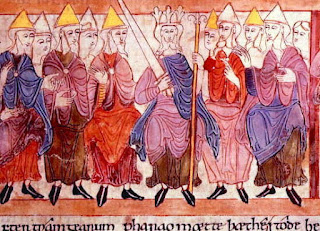Early Anglo-Saxon England was filled with clans and communities that made policies and laws and settled disputes during a regular gathering called the folkmoot (meeting of the people), in which all free members of the clan or district participated.
From before the 7th century until the 11th century, the folkmoot evolved into the witenagemot, the meeting (gemot) of the wise men (witena, singular witan). Sometimes this was called simply the Witan. The Witan consisted of the more powerful members of the tribe or district, and their function was nationwide, as advisers to the king. Although the term appears only nine times prior to 1066 in English records, and its functions are not documented—this was long before England's love of meticulous record-keeping—it is clear that an assembly of this kind had great importance prior to the political upheaval of the Norman Invasion.
The power of the Witan may have altered over time, but there is evidence that they had a role in kingly succession. When King Æthelred the Unready* fled England in 1013, driven out by Sweyn Forkbeard (King of Denmark and parts of Norway), the Witan proclaimed Sweyn king on Christmas Day. When Sweyn died five weeks later, the Witan called Ethelred back from Normandy and re-proclaimed him king—but only if he promised to be a better ruler. (He promised.)
Witan was actually used in several contexts to refer to a group of advisers or decision-making bodies for different levels of society. We find references to theodwitan (people's witan), Angolcynnes witan (England witan), and one archbishop advised bishops, when they travel, to take a witan with them for help.
*The term "Unready" meant not that he was ill-prepared, but that he was ill-advised; it is from rede which means "advice."
